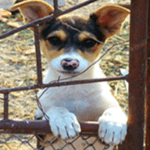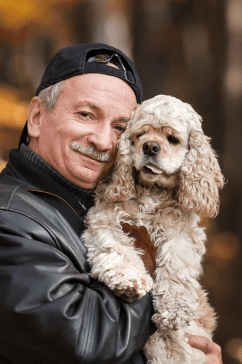 When deciding to get a dog, most people automatically assume that they will be getting a puppy or a young dog. This is a shame because adopting an older dog will give the dog another chance at a happy life and you will get so much more joy out of an older dog. They know that they have been given a second chance and will provide you with more love and devotion than you can imagine.
When deciding to get a dog, most people automatically assume that they will be getting a puppy or a young dog. This is a shame because adopting an older dog will give the dog another chance at a happy life and you will get so much more joy out of an older dog. They know that they have been given a second chance and will provide you with more love and devotion than you can imagine.
Why do most families look at adopting puppies before adults? There are a lot of reasons but here are some of the most common…
Many people feel that adult dogs are untrainable and may have developed bad habits that can’t be changed. They may also feel that adult dogs will not love them as much since they haven’t been around them as long. These worries are often unfounded and are unlikely to occur.
A big reason is that puppies are so darn cute. They have big noses, eyes, and flappy, extra skin. They bounce around the room and will win you over with their playfulness. It is hard to resist a cute puppy in a box just waiting for a new home. An adult dog is not nearly as cute, especially if they have been abused and have scars or disfigurements.
As cute as puppies are, there is nothing like the love of an older dog, especially one who has been given a second chance at life.
Table of Contents
Pros & Cons of Adopting Adult Dogs
As we all know, adopting a dog, or even a puppy, isn’t always easy and there are positives and negatives to consider. Before adopting, compare the pros and cons to see if an adult dog will be a good fit for you and your family.
The Pros:
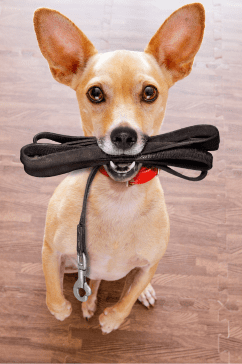 When you adopt an older dog, you can often skip the headache of housetraining the dog. Most adult dogs understand that they only go potty outside and they can hold their bladder longer than puppies so they won’t have ‘accidents’ indoors.
When you adopt an older dog, you can often skip the headache of housetraining the dog. Most adult dogs understand that they only go potty outside and they can hold their bladder longer than puppies so they won’t have ‘accidents’ indoors.
An adult dog will be fully grown which takes the guesswork out of figuring out the size of the dog. A little puppy could easily grow into a large dog, especially if it is a mixed breed or if you don’t know the dog’s breed at all.
Adult dogs will also be a lot calmer and have lower energy levels than puppies. They will require a lot less exercise and will sleep a lot (depending on the breed) which is helpful if you work a full-time job or don’t have a lot of extra time in your schedule.
Another positive that comes with adopting an adult dog is that they usually know basic commands and are done with the teething/stealing/barking/howling/being a brat stage. Of course, not all adults know basic manners but adult dogs remember commands easier and they can be easier to train than a puppy.
The Cons:
 Mature dogs may come with bad habits that they learned or developed in their previous home. These bad habits can be difficult to change.
Mature dogs may come with bad habits that they learned or developed in their previous home. These bad habits can be difficult to change.
If the dog is not housebroken, it can be a huge pain. Older dogs are harder to housetrain than puppies and it will take a lot of time, patience, and effort to get them housebroken. On the same note, senior dogs may have incontinence problems that will require doggie diapers.
Some adult dogs have never been around cats, children, dogs, men, or women. They may not have any social skills at all and could show signs of aggression, fear, or anxiety.
Senior dogs may have health problems such as diabetes, obesity, arthritis, kidney problems, hearing loss, heart trouble, or Lyme disease. Some of these problems may be related to aging while some may be hereditary. Treating these health issues will cost money. A puppy may develop these problems eventually but, you may be able to prevent these problems with a good diet, exercise, and regular veterinary checkups.
Unfortunately, a big negative to adopting an older dog is that you won’t be able to spend as much time with the dog before he or she crosses the rainbow bridge. Senior dogs may only have a few years left of life, however, you can make these last few years their best years. Smother them with love and affection and the few years you have with the dog will feel like a lifetime.
Should You Adopt an Adult Dog?
After weighing the pros and cons of adopting an adult dog, you should take a look at your life and how a dog would fit into it. Here are a few questions you should consider before deciding to adopt:
What do your finances look like?
Besides the adoption fee of at least $50 (expect a fee closer to $100 at most shelters), you will also need to pay for toys, collars, treats, food, crates, training supplies, leashes, poop bags, vet bills, training classes and more. Dogs are very expensive and if the dog has any health issues, the costs could skyrocket.
It is possible to own a dog on a tight budget. Consider adopting a smaller dog and be sure to check out Craigslist or Freecycle for used crates and other equipment you may need. There are also programs available in some communities that will provide you with low-cost veterinary services.
Do you own other animals or have children?
If you have other animals or pets living in your home, you need to make sure they will be able to handle having a new dog in the home. Some dogs or cats will not tolerate a new dog joining their pack and coming into their territory. Also, consider any children that live in your household. Not all children are good with animals and you might need to teach them how to behave around a dog. If you have a young child who does not listen very well and you are afraid of him or her abusing the animal, especially if you don’t have time to keep an eye on the child at all times, it may be best to wait a few years until the child has more self-control and can follow directions.
How much free time do you have?
Older dogs do not need as much of your time as puppies, however, some breeds can be very needy. Also, younger dogs may still have puppy-like energy. If you don’t have a lot of time to devote to a hound, then consider a lazier breed such as a basset hound or a greyhound. If you have a lot of extra energy to burn off, then consider a terrier or a herding breed.
Adopting an Older Dog: How to Choose The Right Dog For You
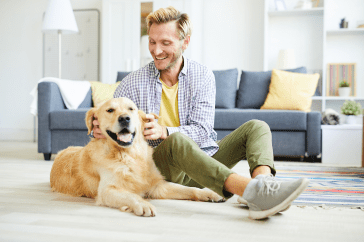 Deciding on which dog to adopt can be a challenge, especially when there are dozens of dogs to choose from at the pound or rescue center. You don’t want to make a snap judgment and adopt the first dog you see.
Deciding on which dog to adopt can be a challenge, especially when there are dozens of dogs to choose from at the pound or rescue center. You don’t want to make a snap judgment and adopt the first dog you see.
Before you head to the pound, think about the type of dog you are looking for. Some questions to consider are: Do you want a big dog or a small dog? What sex? What breed are you looking for? Do you want a dog that has a lot of energy or one that is low energy? Does the dog have to get along with children or other pets? Are you willing to adopt a senior dog or are you looking for a younger dog?
When you get to the shelter, let the staff know the type of dog you are looking for and tell them about your lifestyle. They will work with you to find you the perfect dog. They will show you dogs that they believe will be compatible with your family and lifestyle, based on what you told them. Spend some alone time with each dog you are considering before making a choice.
Bringing Home Your New Hound: Tips for the First Few Days
Bringing home a new dog can be a very exciting time, however, it can be unsettling and scary for the dog. Here are a few things you can do to help your hound adjust to his new home:
Give the Dog Space
Give the dog some space to explore his new environment. Let him sniff around, check things out, and take a nap. Give him plenty of time to get familiar with his new home and family.
Give the Dog Structure
Set up a schedule for the first few weeks to give the dog some structure. The dog will feel more secure when he knows approximately what time he will be fed, walked, and put in his crate to sleep.
Establish Ground Rules
Set up ground rules right away. If you don’t want the dog on the furniture, then don’t allow him on the furniture when he first comes home. If you don’t want the dog to beg during meal time, then teach him to sit in the other room or go in his crate during meal time. Another thing to consider is sleeping arrangements. Do you want the dog in the bed or the crate at night? Setting the ground rules right away will help avoid confusion in the future.
Visit the Vet
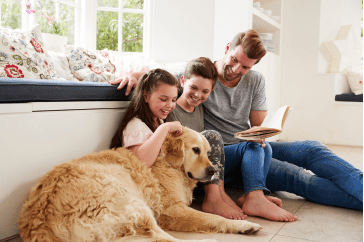 Get a vet check-up within the first week or two. While the shelter probably gave the dog a checkup, there may be issues that weren’t looked into. A vet can help identify these issues so they won’t be a problem down the road. If you need help housebreaking your older dog, then check out this article.
Get a vet check-up within the first week or two. While the shelter probably gave the dog a checkup, there may be issues that weren’t looked into. A vet can help identify these issues so they won’t be a problem down the road. If you need help housebreaking your older dog, then check out this article.
Don’t Switch Foods
Don’t change the dog’s diet. Ask the shelter or foster organization what the dog was eating so you can feed him or her the same food. This will help prevent stomach issues from a sudden change in their diet. If you don’t know what they were eating at the shelter, then purchase a high-quality dog food and add white rice to it. This should help prevent stomach problems.
ID Your Dog
Purchase a dog ID tag before you even bring Fido home and attach it to a strong collar. Your new dog will not be familiar with your home, yard, and neighborhood. He or she may have been a stray previously and is used to wandering off. Having a collar and ID tag on his neck will help get him back home if he disappears.
Relax and Don’t Stress
Relax and lower expectations. Adopting a dog can be a nerve-racking experience for both the owner and the dog. You may not get along initially with the dog and you may not feel a strong bond right away. Over time, the bond will develop and you will enjoy a long, happy, and loving relationship. It is important to not rush things and to not expect too much. Relationships take time and effort. Give the dog plenty of love and patience and the two of you will soon become best friends.
For More Information:
Animal Rescue Fund of the Hamptons, Inc – Adopt a Senior Dog in Honor of Betty White
Texas A&m University – Teaching An Old Dog New Tricks: Adopting Senior Dogs


